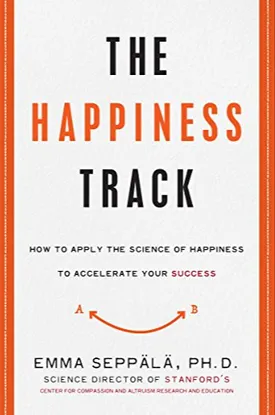The Happiness Track: How to Apply the Science of Happiness to Accelerate Your Success by Emma Seppala
Being successful in life depends on a variety of factors, from luck, including being at the right place and the right time, to hard work and dedication. But, is there something more to it? In her book The Happiness Track: How to Apply the Science of Happiness to Accelerate Your Success, psychologist Emma Seppala argues that true success partly depends on one’s level of happiness. The book presents a comprehensive scientific look at the concept of happiness and offers practical steps that individuals can take to leverage it and achieve success in life.
At its core, the book is an exploration of the power of positive emotion and why it is so important in achieving our goals. Seppala argues that when we are feeling happy, our minds and bodies become more resilient, more creative, and more motivated. Through the lens of scientific research, she explores the differences between happiness and pleasure, and argues that a sense of purpose and a well-regulated emotional system are more likely to bring you true joy and happiness over time.
The book provides practical advice on how to increase your level of happiness. Seppala argues that individuals should pursue what she calls “the three Ts:” Training, which involves activities such as mindfulness, gratitude, and positive self-talk; Tending, which involves nurturing relationships with others and spending time in nature; and Transforming, which involves changing your daily practices and adopting a more compassionate and authentic lifestyle.
In addition to providing practical advice, the book also provides insight into the importance of self-awareness in the pursuit of happiness and success. Seppala argues that in order to find success and happiness, individuals must be aware of their own emotions and learn to understand and manage them. The book emphasizes practices such as deep listening, self-understanding, and creativity.
Finally, Seppala encourages readers to stay positive, even in the face of failure. Focusing on the positives, she argues that failure should be seen as an opportunity to learn and find a better path forward. Additionally, she advises readers to focus on finding joy in the present moment, and to recognize that it is just as important to find happiness in the everyday moments of life as it is to strive for big goals.
Overall, The Happiness Track provides an insightful and practical guide to applying the science of happiness to one’s life, and achieving success through a more positive and mindful lens. By providing in-depth scientific insight, personal stories, and practical tips and exercises, Seppala encourages readers to take time to think, introspect, and make changes that will enhance their happiness and life fulfillment. As such, The Happiness Track offers an important and valuable addition to our understanding of the power of positive emotion and its role in achieving success.

